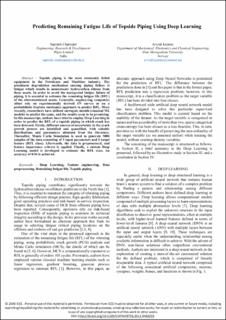| dc.contributor.author | Keprate, Arvind | |
| dc.contributor.author | Chatterjee, Supratik | |
| dc.date.accessioned | 2022-04-07T07:44:49Z | |
| dc.date.available | 2022-04-07T07:44:49Z | |
| dc.date.created | 2022-01-24T17:09:45Z | |
| dc.date.issued | 2021-06-29 | |
| dc.identifier.isbn | 978-1-7281-5934-8 | |
| dc.identifier.isbn | 978-1-7281-5935-5 | |
| dc.identifier.uri | https://hdl.handle.net/11250/2990377 | |
| dc.description.abstract | Topside piping is the most commonly failed equipment in the Petroleum and Maritime industry. The prominent degradation mechanism causing piping failure is fatigue which results in unnecessary hydrocarbon release from these assets. In order to avoid the unexpected fatigue failure of piping, it is essential to estimate the remaining fatigue life (RFL) of the aforementioned assets. Generally, engineering companies either rely on experimentally derived SN curves or on a probabilistic fracture mechanics approach to predict RFL. More recently, researchers have utilized surrogate models (classical ML models) to predict the same, and the results seem to be promising. In this manuscript, authors have tried to employ Deep Learning in order to predict the RFL of a topside piping in which crack has been detected. Firstly, different sources of uncertainty in the crack growth process are identified and quantified, with suitable distributions and parameters obtained from the literature. Thereafter, Monte Carlo Simulation is used to generate 5000 samples of the data consisting of 3 input parameters and 1 target feature (RFL class). Afterwards, the data is preprocessed, and feature importance criteria is applied. Finally, a custom Deep Learning model is developed to estimate the RFL class. An accuracy of 0.96 is achieved. | en_US |
| dc.language.iso | eng | en_US |
| dc.publisher | Institute of Electrical and Electronics Engineers | en_US |
| dc.relation.ispartof | Proceedings of the International Conference on Applied Artificial Intelligence (ICAPAI) 2021 | |
| dc.relation.ispartofseries | International Conference on Applied Artificial Intelligence (ICAPAI);2021 International Conference on Applied Artificial Intelligence (ICAPAI) | |
| dc.subject | Deep learning | en_US |
| dc.subject | Feature engineering | en_US |
| dc.subject | Data preprocessing | en_US |
| dc.subject | Remaining fatigue lives | en_US |
| dc.subject | Topside piping | en_US |
| dc.title | Predicting Remaining Fatigue Life of Topside Piping Using Deep Learning | en_US |
| dc.type | Conference object | en_US |
| dc.description.version | acceptedVersion | en_US |
| cristin.ispublished | true | |
| cristin.fulltext | postprint | |
| cristin.fulltext | original | |
| cristin.qualitycode | 1 | |
| dc.identifier.doi | https://doi.org/10.1109/ICAPAI49758.2021.9462055 | |
| dc.identifier.cristin | 1988899 | |
| dc.source.volume | 1 | en_US |
| dc.source.issue | 1 | en_US |
| dc.source.pagenumber | 6 | en_US |
